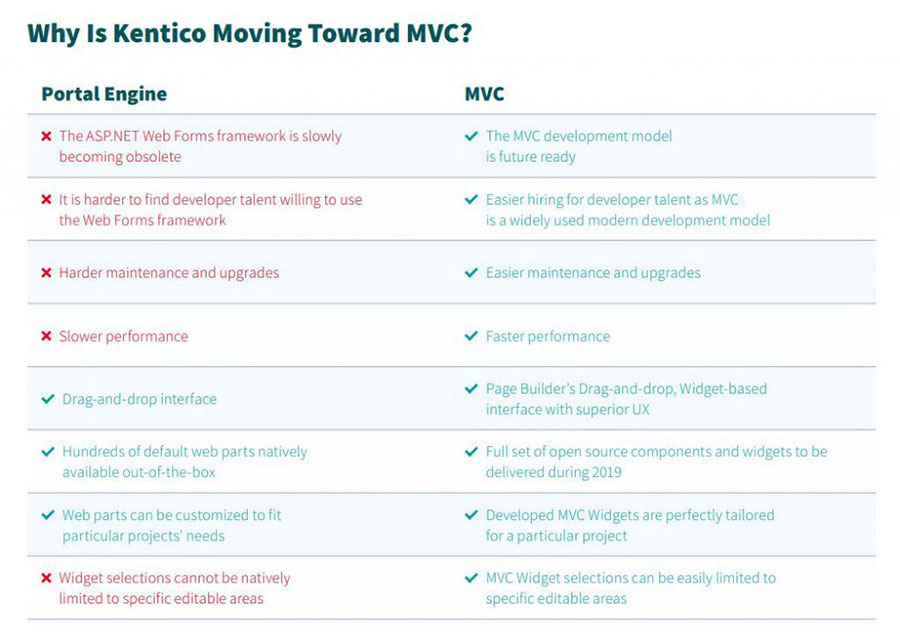Why the shift?
Over the past several years, ASP.NET code strategies have evolved and improved significantly. The use of Web Forms in .NET development is phasing out, and MVC is the industry-wide preferred framework.
This isn’t a shift specific to Kentico though. In fact, all .NET-based platforms have gone through or are facing similar transitions. In recent years, MVC has become the standard for .NET development as it is generally more scalable and future friendly for developers. Therefore, the update from Kentico Portal Engine to Kentico MVC isn’t so surprising given MVC’s popularity and preference around the globe by .NET developers.
What’s the real difference in Portal Engine and MVC?
Kentico Portal Engine is designed for websites using ASP.NET Web Forms. It is often referred to as “Kentico Web Forms” (you may see us use the term interchangeably). In late 2015, Kentico began releasing ASP.NET MVC versions, too. These dual version launches for both Web Forms and MVC have given clients time to continue reaping the benefits of their Web Forms properties, while Kentico’s development team has perfected their MVC offering over the past few years.
Fast-forward to the release of Kentico 12 MVC in late 2018, and we note a significant change from past major upgrade announcements. This marked the first time Kentico advised all clients to migrate from Web Forms to MVC. Before, it was a choice based on which framework you preferred to develop. Now, Kentico is solely marketing their MVC product with a sunset timeline for any Portal Engine support by the end of 2023*.
If you’re currently on a Kentico Portal Engine version (you’re using Web Forms), you’ve still got some time, but you will need to migrate your website to Kentico MVC within the next 1-2 years in order to maintain a fully supported site.
*Updated as of April 1, 2020 per Kentico’s support extension announcement. Please note, hotfixes for Kentico 12 Portal Engine will still end in 2021.
Features & benefits comparison
Kentico 12 MVC offers a robust feature set and several advantages for both developers and content marketers. From a technical perspective, moving to an MVC architecture makes it significantly easier for your development team to support and scale your site over time. Best of all, you’ll gain better performance overall, and more flexible autonomy for your marketing team.
Most notably, MVC empowers you with a more flexible and scalable website solution for the long game. Here are a just a few of those benefits:

What to do next
This shift to MVC doesn’t mean that websites currently built on Web Forms are suddenly out of date or unreliable. Kentico’s Web Forms product is excellent, and thousands of websites rely on this technology every day. But a CMS solution is just like any other sales or marketing tool for your business—it needs proper support and scalability to keep growing revenue and ROI.
Curious if your site would benefit from migrating to Kentico MVC?
Let’s talk